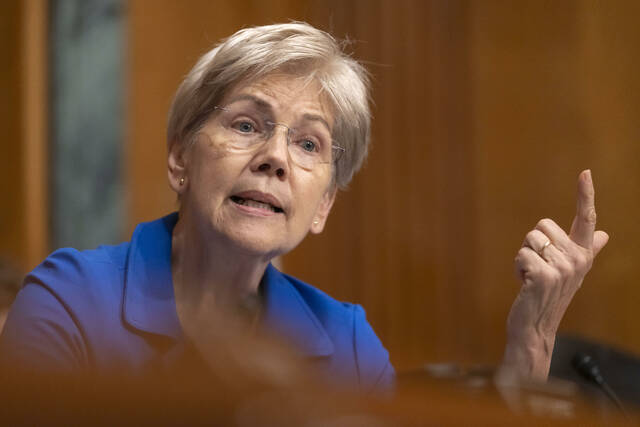https://triblive.com/opinion/phil-kerpen-uncapping-fdic-insurance-is-a-bipartisan-bad-idea/
Phil Kerpen: Uncapping FDIC insurance is a bipartisan bad idea

It isn’t often that two senators as far apart ideologically as Republican Bill Hagerty of Tennessee and Democrat Angela Alsobrooks of Maryland get together on a piece of legislation. The bill they wrote together — the Main Street Depositor Protection Act — deserves a closer look.
The bill would raise the FDIC insurance limit on noninterest-bearing transaction accounts from $250,000 per account to $10 million, while raising contributions over a 10-year transition period.
Deposit guarantees are nice for people and companies with huge account balances, but they come at a cost — the contributions, a de facto tax, that banks are charged to fund the FDIC insurance pool. That cost is a socialization of risk that penalizes small depositors to prevent large depositors from bearing the burden of due diligence to make sure the banks they do business with are financially sound.
Community banks originally opposed the bill because of the burden of paying higher contributions, so they were carved out with a 10-year exemption. But those smaller banks still stand to lose when the exemption ends. And, sooner or later, customers of all banks, 99% of whom will never exceed the $250,000 limit, face higher fees, lost interest and reduced account features due to increased contributions.
The 10-year exemption also has the obvious problem that the burden on community banks will be no more tolerable 10 years from now than it is today. As Norbert Michel of Cato points out, the Independent Community Bankers of America made a similar deal with Barney Frank to support Dodd-Frank, a deal they now surely regret as they have been bombarded by expensive rules and regulations from that agency.
Haggerty’s best argument is the big money center banks have an implicit government deposit guarantee that would be counterbalanced by expanding the FDIC’s explicit guarantee to smaller banks. But the solution to moral hazard is not more moral hazard but less.
Congress should focus on financial reforms that scale back government guarantees and allow market institutions to fail if they take undue risks. A $10 million FDIC limit does the opposite; it means more institutions potentially taking undue risks with the consequences absorbed by taxpayers.
The simple reality is very few bank accounts exceed the current $250,000 limit, and there are a wide variety of market products that syndicate deposits and use other techniques to make the effective limit as much as $1 million or more already. This is a solution in search of a problem with potentially serious adverse consequences.
Those consequences go beyond the cost of higher contributions.
Sen. Elizabeth Warren, D-Mass., supports raising the FDIC limit as part of an effort to exert more political control of the financial system. “You bet I’d tie them together,” she told Bloomberg when asked if tighter regulation would come along with higher FDIC limits.
Stronger federal guarantees over time mean more political power and therefore more political influence. And, ironically, banks having to worry about the reactions of their political masters to their decisions introduce a non-economic factor that makes financial crises more likely.
Smaller banks can and do compete on the basis of technology, convenience, service and value. Higher FDIC limits would cause more harm than good.
Phil Kerpen is the president of American Commitment and the author of “Democracy Denied.”
Copyright ©2026— Trib Total Media, LLC (TribLIVE.com)
